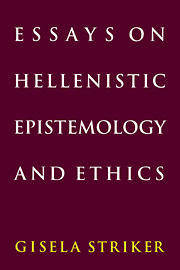Book contents
- Frontmatter
- Contents
- Preface
- Acknowledgments and essay sources
- List of abbreviations: Frequently cited names and titles
- EPISTEMOLOGY
- ETHICS
- 8 Greek ethics and moral theory
- 9 Ataraxia: Happiness as tranquillity
- 10 Epicurean hedonism
- 11 Origins of the concept of natural law
- 12 Following nature: A study in Stoic ethics
- 13 The role of oikeiōsis in Stoic ethics
- 14 Antipater, or the art of living
- 15 Plato's Socrates and the Stoics
- Name index
- Index of passages cited
11 - Origins of the concept of natural law
Published online by Cambridge University Press: 05 June 2012
- Frontmatter
- Contents
- Preface
- Acknowledgments and essay sources
- List of abbreviations: Frequently cited names and titles
- EPISTEMOLOGY
- ETHICS
- 8 Greek ethics and moral theory
- 9 Ataraxia: Happiness as tranquillity
- 10 Epicurean hedonism
- 11 Origins of the concept of natural law
- 12 Following nature: A study in Stoic ethics
- 13 The role of oikeiōsis in Stoic ethics
- 14 Antipater, or the art of living
- 15 Plato's Socrates and the Stoics
- Name index
- Index of passages cited
Summary
The puzzle that has led me to put together the story that follows is, I think, one that will be familiar to every reader of early modern philosophy: what is natural about natural law?
The term “natural law” refers, it would seem, to the rules of morality conceived of as a kind of legal system, but one that has not been enacted by any human legislator. By contrast to human legal codes, the natural law is supposed to be valid independently of any formal procedures, and such that it cannot be changed. Besides, this law is supposed to provide the standards by which human legislation is to be judged – laws will be just or unjust depending on whether they do or do not conform to natural law. This is, at any rate, the concept of natural law that I'm going to talk about.
Why should such a code of moral rules be called natural law? What nature is one appealing to here? The nature of the universe? or of man? or of human society? It seems that all those answers have in fact been given, once the term “natural law” had become part of the legal and philosophical vocabulary. So there seems to be no single correct answer to my initial question; but it might still be worth asking how this very flexible notion arose, who introduced it, and for what purpose.
- Type
- Chapter
- Information
- Essays on Hellenistic Epistemology and Ethics , pp. 209 - 220Publisher: Cambridge University PressPrint publication year: 1996
- 4
- Cited by



